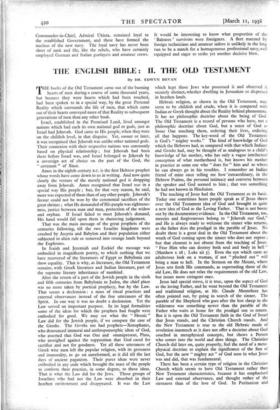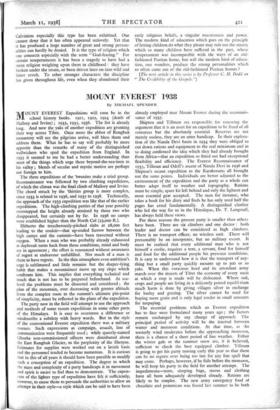THE ENGLISH BIBLE : II. THE OLD TESTAMENT
By DR. EDWYN BEVAN
THE books of the Old Testament came out of the burning hearts of men during a course of some thousand years, but because they were hearts which had been touched, had been spoken to in a special way, by the great Personal Reality which surrounds the life of men, that which came out of their hearts conveyed more of that Reality to subsequent generations of men than any other book.
Israel, established in the Promised Land, lived amongst nations which had each its own national god or gods, just as Israel had Jehovah. God came to His people, when they were on the childish level, in that disguise. Yet, sooner or later, it was recognised that Jehovah was unlike other national gods. Their connexion with their respective nations was commonly based on physical relationship ; but Jehovah had been there before Israel was, and Israel belonged to Jehovah by a sovereign act of choice on the part of the God, the " covenant " of Sinai.
Amos in the eighth century B.C. is the first Hebrew prophet whose words have come down to us in writing. And now quite clearly the vesture of the merely national god is dropping away from Jehovah. Amos recognised that Israel was in a special way His people ; but, for that very reason, he said, more was expected of them than of any other people. Jehovah's favour could not be won by the ceremonial sacrifices of the great shrines ; what He demanded of His people was righteous- ness, justice between man and man, protection of the widow and orphan. If Israel failed to meet Jehovah's demand, His hand would fall upon them in shattering judgement.
That was the main message of the great prophets of the centuries following, till the two Israelite kingdoms were crushed by Assyria and Babylon and their population either subjected to alien rule or removed into strange lands beyond the Euphrates.
In Isaiah and Jeremiah and Ezekiel tfie message was embodied in magnificent poetry, to which nothing that we have recovered of the literatures of Egypt or Babylonia can show equality. That is why, as literature, the Old Testament remains, with Greek literature and Indian literature, part of the supreme literary inheritance of mankind.
After the return of a part of the Jewish people in the sixth and fifth centuries from Babylonia to Judea, the chief place was no more taken by poetical prophecy, but by the Law. That seems a declension : a mass of ritual practices and external observances instead of the free utterances of the Spirit. In one way it was no doubt a declension. Yet the Law served an important purpose. In its legal formalities some of the ideas for which the prophets had fought were embodied for good. We may see what the " Mosaic " Law did for the Jewish people, if we compare the case of the Greeks. The Greeks too had prophets—Xenophanes, who denounced immoral and anthropomorphic ideas of God, who asserted that God was One and ommipresent, Plato, who inveighed against the supposition that God cared for sacrifice and not for goodness. Yet all these utterances of Greek wise men left the popular religion, with its grossness and immorality, to go on unreformed, as it did till the last days of ancient paganism. Their purer ideas were never embodied in any code which brought the mass of the people to conform their practice, in some degree, to those ideas. That is what the Law did for the Jews. Those groups of Israelites who had not the Law were absorbed in their heathen environment and disappeared. It was the Law which kept those Jews who possessed it and observed it securely distinct, whether dwelling in Jerusalem or dispersed in heathen lands.
Hebraic religion, as shown in the Old Testament, may seem to be childish and crude, when it is compared with Indian or Greek thought about the Reality behind phenomena. It has no philosophic doctrine about the being of God. The Old Testament is a record of persons who have, not a philosophic doctrine about God, but a sense of God as Some One touching them, ordering their lives, ordering all that happens. The key-word of the Old Testament is God's " mighty works." The kind of knowledge of God which the Hebrews had, as compared with that which Indians and Greeks had, may be thought of as analogous to a child's knowledge of his mother, who has only a vague intellectual conception of what motherhood is, but knows his mother in practice as some one who " does for " him and to whom he can always go in his troubles. I remember an Indian friend of mine once telling me how -extraordinary, in the Hebrew Psalms, the personal intimacy and converse between the speaker and God seemed to him ; that was something he had not known in Hinduism.
The teaching of Jesus had the Old Testament as its basis. Today one sometimes hears people speak as if Jesus threw over the Old Testament idea of God and brought in quite a new idea of God as the Loving Father. ' That is not borne out by the documentary evidence. In the Old Testament, too, mercies and forgivenesses belong to " Jehovah our God," and He is always ready to welcome the sinner who returns, as the father does the prodigal in the parable of Jesus. No doubt there is a great deal in the Old Testament about the wrath of God coming upon the sinner who does not repent ; but that element is not absent from the teaching of Jesus. " Fear Him who can destroy both soul and body in hell " (Matthew x 28 ; Luke xii 5). Even the eye which casts an adulterous look on a woman, if not " plucked out " will bring a man to hell. In the Sermon on the Mount, where Jesus sets forth His commands, as superseding those of the old Law, He does not relax the requirements of the old Law, but issues more stringent ones.
Jesus laid special stress, it is true, upon the aspect of God as the loving Father, and he went beyond the Old Testament and traditional religion, as Mr. Claude Montefiore has often pointed out, by going in search of the sinner. The parable of the Shepherd who goes after the lost sheep in the wilderness was something newer than the parable of the Father who waits at home for the prodigal son to return. But it is upon the Old Testament faith in the God of Israel that Jesus stands, and the Christian Church stands. And the New Testament is true to the old Hebraic mode of revelation inasmuch as it does not offer a doctrine about God couched in metaphysical concepts, but shows a Person who comes into the world and does things. The Christian Church did later on, quite properly, feel the need of a meta- physical doctrine to explain the significance of the Son of God, but the new " mighty act " of God seen in what Jesus was and did, that was fundamental.
There has been a certain type of religion in the Christian Church which seems to have Old Testament rather than New Testament characteristics, because it has emphasised Law and external observance, and thought rather of the sternness than of the love of God. In Puritanism and Calvinism especially this type has been exhibited. One cannot deny that it has often appeared unlovely. Yet that it has produced a large number of great and strong person- alities can hardly be denied. It is the type of religion which one connects especially with the term " God-fearing." For certain temperaments it has been a tragedy to have had a stem religion weighing upon them in childhood : they have broken under the strain, or been driven later on into wild and bitter revolt. To other stronger characters the discipline has given throughout life, even when they abandoned their early religious beliefs, a singular massiveness and power. The modem kind of education which goes on the principle of letting children do what they please may rule out the misery which so many children have suffered in the past, whose temperament was incompatible with the ways of an old- fashioned Puritan home, but will the modern kind of educa- tion, one wonders, produce the strong personalities which so often came out of the old-fashioned Puritan homes ?
[The next article in this series is by Professor C. H. Dodd on " The Credibility of the Gospels."]











































 Previous page
Previous page